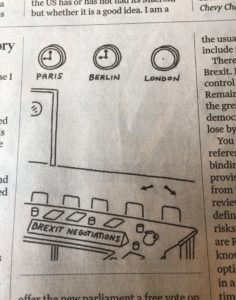
When pondering the policies of governments, it usually makes sense to assume that they are based on some kind of logic. Try as I might, though, I can’t make this rationalist perspective work for the UK government’s proposals for how the Irish border will be managed after Brexit.
And it turns out that I am not alone. The Irish Times columnist (and Princeton professor) Fintan O’Toole has written a coruscating piece about it. He summarises the May government’s proposition thus:
to understand how this seems to the Irish government and to most people on the island, imagine you are in a decent job. It is reasonably paid, apparently secure and the working environment is quite amicable. Your neighbour, who you like but do not quite trust (there’s a bit of history there) comes to you with a proposition. She’s establishing an extremely risky start-up venture with a high probability of catastrophic failure. Will you join her? Well, you ask, what are the possible rewards? Ah, she says, if – against the odds – everything goes splendidly, you’ll get the same pay and conditions you have now.
This is, in essence, what the British government is offering Ireland. If everything goes fantastically well, you’ll end up with, um, the status quo. Trade will “operate largely in the same way it does today”. The position paper is effectively a hymn to the way things are now. We don’t have a hard border, and we won’t after Brexit. We do have a common travel area that works remarkably well, and it will continue to go splendidly. The position paper takes existing realities and repositions them as a distant mirage, a fantastical possibility: less emerald isle, more Emerald City.
As with the whole Brexit project, the proposals for Ireland are credible only if you accept two mutually incompatible propositions: a) The UK is creating the biggest political and economic revolution since 1973; b) pretty much everything will stay the same…
The only term I can think of that describes the UK government’s approach to the Border issue (and perhaps to many other aspects of the Brexit process) is magical thinking, i.e. “the belief that one’s thoughts by themselves can bring about effects in the world or that thinking something corresponds with doing it.”



